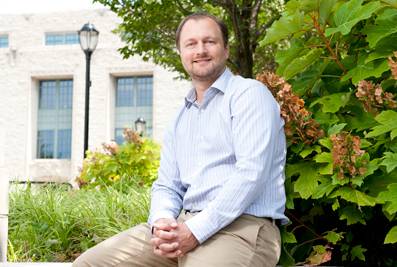Paper or Plastic? Well, It’s Complicated
New to McCormick, Sustainability Expert Eric Masanet Brings Eye for the Big Picture
A decade ago, Ireland took bold action to combat plastic waste, levying a tax at the register — today, 22 cents — per plastic bag. Consumption of the bags dropped by over 90 percent after the first year, according to some analysts.
A slam-dunk for conservation, right? Maybe not. What the numbers didn’t reflect was the potential for a seven-fold increase in diesel pollution by trucks hauling paper bags, which require seven times more packing space than plastic. Nor did the policy foresee a spike in store-bought garbage liners — made with far more plastic than flimsy shopping bags — that people purchased when they couldn’t re-use the freebies in their trashcans.
 “Intuitively it seems like a great idea: let’s get rid of plastic bags,” said Eric Masanet, associate professor of mechanical engineering and chemical and biological engineering at the McCormick School of Engineering and Applied Science. “But there were unintended consequences that weren’t foreseen because policy makers didn’t have a big-picture view of how these products were used.”
“Intuitively it seems like a great idea: let’s get rid of plastic bags,” said Eric Masanet, associate professor of mechanical engineering and chemical and biological engineering at the McCormick School of Engineering and Applied Science. “But there were unintended consequences that weren’t foreseen because policy makers didn’t have a big-picture view of how these products were used.”
Masanet (MS ’96), a sustainability expert who joined the McCormick faculty in June, is dedicating his career to seeing that big picture. By advancing a method called “life-cycle analysis,” Masanet studies the environmental impacts for the entire life cycle of products, from manufacturing to consumption to disposal. The goal: to quantify the energy usage, emissions, and environmental effects of current and potential technologies and behaviors to inform smarter manufacturing processes and policies.
“From a sustainability perspective, my research seeks to determine where we are today, where could be, and the steps we can take to get there,” Masanet said. “Putting numbers on potential reduction opportunities is an important first step in designing policy, as these numbers illuminate where design can make a difference, where manufacturing can make a difference, and so on.”
Masanet, who received his MS in mechanical engineering from McCormick, returns to his alma mater after eight years at the University of California, Berkeley, and Lawrence Berkeley National Laboratory, where he led research in industrial energy systems optimization, green design and manufacturing, and life cycle assessment. Through collaborations with the U.S. Department of Energy and Environmental Protection Agency, his research has informed national and regional industrial energy and climate policy.
The systems that Masanet studies are vast. To analyze the life cycle of consumer electronics, for instance, one must consider a host of concerns that affect countries around the globe: land-use issues related to mining and extracting raw materials; energy required for manufacturing and operating devices; and disposal or recycling, often in health-hazardous conditions in developing nations. And while people often want a clear answer about what products or behaviors are “greener,” the answers are often nuanced and reliant on consumer behavior.
But solutions are possible. In a 2011 study, Masanet analyzed how various manufacturing, design, and operations improvements could reduce the energy use of data centers, which account for nearly 2 percent of U.S. electricity consumption. This work pinpointed seven specific mitigations to show how efficient the centers could be, from utilizing new technology to reduce the number of servers to switching to more efficient energy-saving computers. If all the measures were enacted, the team found, U.S. data centers could reduce their electricity use by 80 percent —an amount equivalent to twice the annual electricity use of the city of Los Angeles.
“Our data center research to date has supported decision-making in Washington,” Masanet said. “That is my goal: to effect change that we can point to, where products are being made differently, or new technologies for manufacturing are in place, or policies are changed for the better.”
Masanet said he is “thrilled” to be returning to McCormick, where he will teach courses in mechanical and chemical and biological engineering. He also holds an appointment with the Initiative for Sustainability and Energy at Northwestern, where he has supported the launch of a new University-wide certificate in energy and sustainability, a step he sees as vital to the NU’s role in addressing sustainability challenges.
“Sustainability improvements are vital for a clean planet and a healthy economy, but they’re not going to happen on their own,” he said. “We need to change behavior, change mindsets, realign incentives. It’s going to take bright students getting trained in these areas and going out and making it happen.”